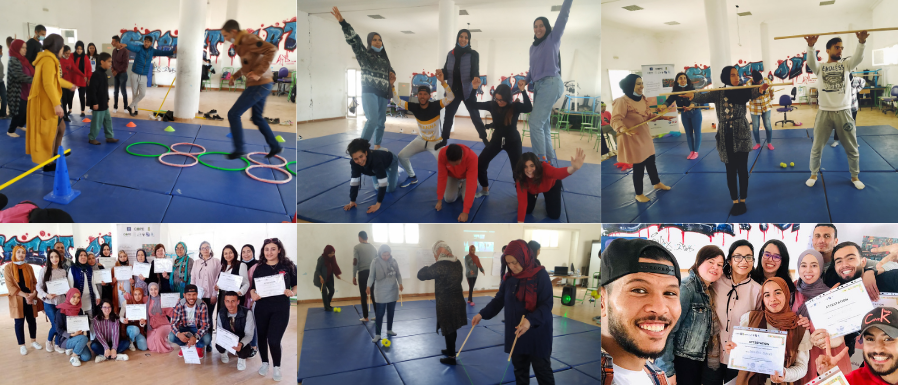The Agency for Local Democracy (LDA) in Tunisia has just successfully held part Ⅱ of the training Psychomotor Activities Adopted from the Circus for Social Inclusion. This activity, carried out in partnership with COPE Italy, is within the project Je Repars de Toi (I Restart from You), which aims to reinforce rights of people with disabilities in Tunisia and promote a culture of inclusion.
While part Ⅰ lasted for 9 days in September 2020, part Ⅱ took place for 11 days from March 24 to April 07, 2021, for the benefit of 25 participants who were educators in specialised rehabilitation centres for people with disabilities and young sportspeople. During the course, the participants explored innovative, unconventional, and flexible exercises that they could employ in various contexts with different disabilities.
It was essential to provide a tolerant non-judgmental space where participants could express themselves, be creative, and develop their capacities
Thus, Tommaso Negri and Leonardo Variale – both instructors in circus arts – presented a plethora of teaching methodologies and techniques. Under their careful supervision, participants explored the importance of creating an engaging, amusing, and safe environment, in which learners acquire confidence to participate without the fear of being judged or labeled. It was essential to provide a tolerant non-judgmental space where participants could express themselves, be creative, and develop their capacities. Collaboration and cooperation among learners and educators were highlighted as key pillars to successfully carry out these activities. Indeed, the educators reinforced their competencies on a learner-centred approach that is based on the premises of teamwork, integration, progression, adaptation, and communication.
The materials used in activities – be they juggling, acrobatic, and balance – were affordable, simple, and recycled: from cans, handkerchiefs, and tennis balls; to sticks, barrels, wooden boards, and pedals. In so doing, the rehabilitation centres could get them and adopt the exercises in their syllabus. Furthermore, using these tools testifies how creativity and innovation could be realised in our environment with already-existing objects.
It was thrilling that a total of 30 students from rehabilitation centres for people with deaf, motor, and mental disabilities visited the training. The young visitors were enthusiastic and delighted to participate in the diverse activities designed by the educators. This was also possible thanks to a prior lesson planning, thanks to which good organisation and coherence were ensured.
By the end of the training, the participants made an outstanding development in organising, adapting, and managing the sessions thanks to their commitment and motivation. It was extremely encouraging to receive their positive feedback and witness their engagement and dedication to their work.
